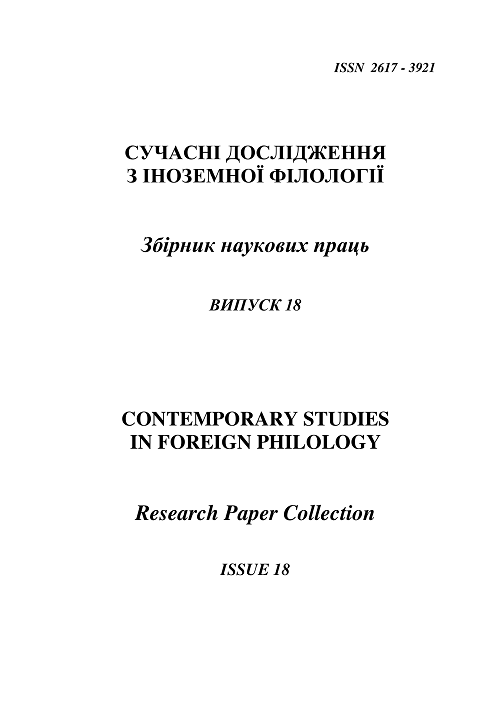Linguocultural approach to the study of lexical semantics
DOI:
https://doi.org/10.24144/2617-3921.2020.18.9-17Анотація
Contemporary linguistics is characterized by the growing interest in the study of lexical semantics. In this respect of primary importance is the in-depth analysis of the system and structural organization of modern English vocabulary. In the globalization period the most perceptible changes in the life of a person, his/her everyday and social activities etc. take place in the language’s vocabulary, i.e. lexis. The latter possesses a variety of verbal means to transfer, reveal, and even alter the existing ones, replacing them by the newly created words together with their meanings. Like any other language, English has its unique system and structure, and also elements, which are hierarchically placed in its semantic space. Both role and place of words are of great significance, and help establish various relationships between the words belonging to a definite group as well as other elements within the language system under research. Complex analysis of lexico-semantic specificity of words makes it possible to deeper study the most essential features of corresponding national cultures. The present paper deals with linguocultural approach to the study of lexical semantics. Lexicographical sources of modern English serve as a means of collecting, analyzing and classifying the obtained language material. English is best and to the fullest extent represented in the dictionaries, especially explanatory ones. On the material of monosemantic adjectives denoting the property of being happy, close links between language and culture, peculiarities of their expressions as well as their verbalization means have been revealed. 19 monosemantic adjectives have been studied, their common and distinctive features determined, their semantic specificity and ways of emotive lexis’ fragment verbalization revealed. On the basis of the conducted research, both semantic and communicative essence of being happy, its expression and functioning peculiarities in English have been determined and described. Keywords: lexical semantics, language vocabulary, culture, system and structure, semantic space, dictionary, common and distinctive features, monosemantic adjectives, linguocultural approach.Посилання
Селіванова О. С. Основи теорії мовної комунікації. Черкаси: Видавництво Чабаненко Ю. А., 2011. 350 с.
Шаховский В. И. Категоризация эмоций в лексико-семантической системе языка. М.: ЛКИ, 2008. 206 с.
Fabian M. Lexical Semantics: New Approach to its Study. Journal of Interdisciplinary Philology.2013. Issue 1-2. P. 5-12.
Fabian M.P. Structural Approach to the Study of Meaning (on the material of adjectives in modern Ukrainian). Philosophy of Language and New Trends in Translation Studies and Linguistics: Collective Monograph. Lviv-Torun: Liha-Press, 2019. Chapter 3. P. 34-51.
##submission.downloads##
Номер
Розділ
Мовознавство
Ліцензія
Автори, які публікуються у цьому журналі, погоджуються з наступними умовами:
- Автори залишають за собою право на авторство своєї роботи та передають журналу право першої публікації цієї роботи на умовах ліцензії Creative Commons Attribution License, котра дозволяє іншим особам вільно розповсюджувати опубліковану роботу з обов'язковим посиланням на авторів оригінальної роботи та першу публікацію роботи у цьому журналі.
- Автори мають право укладати самостійні додаткові угоди щодо неексклюзивного розповсюдження роботи у тому вигляді, в якому вона була опублікована цим журналом (наприклад, розміщувати роботу в електронному сховищі установи або публікувати у складі монографії), за умови збереження посилання на першу публікацію роботи у цьому журналі.
- Політика журналу дозволяє і заохочує розміщення авторами в мережі Інтернет (наприклад, у сховищах установ або на особистих веб-сайтах) рукопису роботи, як до подання цього рукопису до редакції, так і під час його редакційного опрацювання, оскільки це сприяє виникненню продуктивної наукової дискусії та позитивно позначається на оперативності та динаміці цитування опублікованої роботи (див. The Effect of Open Access).

